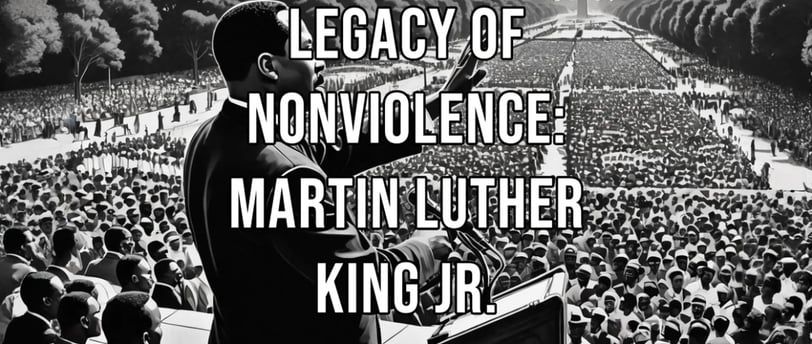Reviving Hope: Lessons from Martin Luther King Jr
Discover the untold story of Martin Luther King Jr. and the foundational experiences that shaped his extraordinary journey for justice and equality. We promise an enlightening exploration into the lesser-known aspects of King's life, from the formidable influence of his father and the segregated South, to the transformative mentorship of Morehouse College President Benjamin E. Mays. These pivotal moments set the stage for King's adoption of Gandhi's nonviolent resistance, a strategy that catalyzed the success of the Montgomery Bus Boycott and the formation of the Southern Christian Leadership Conference. Listen as we unravel the strategic brilliance behind key campaigns like Birmingham and the iconic March on Washington, highlighting the immense power of organized, nonviolent protest.
Footprints In The Dark
10/13/20242 min read


In our latest podcast episode, we delve into the life and enduring legacy of Martin Luther King Jr., unearthing the lesser-known stories and pivotal experiences that shaped his extraordinary journey toward justice and equality. This episode promises an enlightening exploration of King's life beyond the famous "I Have a Dream" speech, delving into the foundational influences that molded his character and strategies for social change.
The episode begins by examining King's upbringing in the segregated South, a crucial period that laid the groundwork for his beliefs. The profound impact of his father's religious leadership and the vibrant faith community that surrounded him were instrumental in shaping his worldview. From a young age, King was exposed to the harsh realities of segregation, which fueled his desire to fight for equality. His early academic achievements and the influential mentorship of Morehouse College President Benjamin E. Mays introduced him to the social gospel, a concept that would become central to his life's work.
King's encounter with Gandhi's philosophy of nonviolent resistance marked a turning point in his life. This philosophy, which he saw as a powerful tool for change, was not merely an intellectual exercise but a practical strategy that resonated deeply with the black church's organized community. The Montgomery Bus Boycott became a testing ground for this approach, demonstrating the immense power of organized, sustained, nonviolent protest. The boycott's success propelled King onto the national stage and led to the formation of the Southern Christian Leadership Conference (SCLC), which played a crucial role in organizing and mobilizing the black church for sustained activism.
The episode also highlights key campaigns like Birmingham and the iconic March on Washington, which showcased the strategic brilliance of King's approach to social change. These campaigns, marked by peaceful protest and resilience in the face of violence, forced the nation to confront the brutal realities of segregation. The March on Washington, attended by a quarter of a million people, was a pivotal moment in the civil rights movement, culminating in King's powerful "I Have a Dream" speech that continues to inspire generations.
As the episode unfolds, it delves into the profound connection between King's civil rights advocacy and his bold stance for peace, particularly his outspoken opposition to the Vietnam War. King saw the war as a symptom of larger systemic issues and had the courage to speak out against it, even at the risk of losing support. His unwavering commitment to the marginalized, exemplified by his support for striking workers in Memphis, highlighted his dedication to economic justice and the broader fight for equality.
The episode concludes by reflecting on King's enduring legacy and how his message of hope and love continues to inspire contemporary movements like Black Lives Matter. His legacy is not confined to the past; it remains a living, breathing force that challenges each generation to strive for a more just, kind, and equitable world. Martin Luther King Jr. Day serves as a powerful reminder of the ongoing fight for justice and the role each of us plays in shaping a better future.
Through this deep dive into Martin Luther King Jr.'s life and legacy, we invite listeners to reflect on their own lives and consider how they can contribute to the ongoing struggle for justice and equality. By understanding King's journey and the values he championed, we can better appreciate the power of nonviolent resistance and the importance of standing up for the marginalized. This episode serves as both a tribute to King's extraordinary life and a call to action for all of us to carry his message forward.
